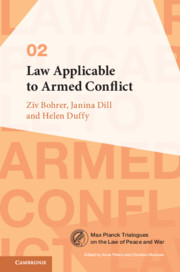Legitimate Targets?
Based on an innovative theory of international law, Janina Dill's book investigates the effectiveness of international humanitarian law (IHL) in regulating the conduct of warfare. Through a comprehensive examination of the IHL defining a legitimate target of attack, Dill reveals a controversy among legal and military professionals about the 'logic' according to which belligerents ought to balance humanitarian and military imperatives: the logics of sufficiency or efficiency. Law prescribes the former, but increased recourse to international law in US air warfare has led to targeting in accordance with the logic of efficiency. The logic of sufficiency is morally less problematic, yet neither logic satisfies contemporary expectations of effective IHL or legitimate warfare. Those expectations demand that hostilities follow a logic of liability, which proves impracticable. This book proposes changes to international law, but concludes that according to widely shared normative beliefs, on the twenty-first-century battlefield there are no truly legitimate targets.
- Proposes a constructivist theory of international law which tells a coherent and exhaustive story of the role of international law in international relations and moves forward a field that has always left significant questions unanswered
- Applies this theory of international law to show how international norms make a difference for behavior in international relations
- Introduces the idea of 'logics of warfare' as different ways in which we can try to balance humanitarian and military imperatives in combat operations
Awards
Joint Runner-up, 2016 Peter Birks Book Prize for Outstanding Legal Scholarship, Society of Legal Scholars
Reviews & endorsements
"Why do states obey international law? How and why do the laws of war constrain state behavior? Legitimate Targets explores the tensions, dilemmas, and power of international humanitarian law to shape the practice of war. This tour de force - rooted in insightful readings of military doctrine, international law, the practice of war, and dozens of interviews with military professionals - is a brilliant synthesis that will enable students of war to understand how and why the nature of war is changing."
Neta C. Crawford, Boston University, author of Accountability for Killing: Moral Responsibility for Collateral Damage in America's Post-9/11 Wars
""Can war be effectively regulated by international law?" In answering this vital question, Janina Dill offers a new and sophisticated understanding of the very nature of law and the way it creates effects in the world. Law is a compromise between utility and morality, between military pragmatism and humanitarianism, but it is also dynamic. It evolves through use and application to new challenges of war-fighting. Dill's excellent book will challenge long-held views about both law and how wars are fought."
Martha Finnemore, George Washington University
Product details
November 2014Hardback
9781107056756
386 pages
229 × 152 × 22 mm
0.68kg
Available
Table of Contents
- Introduction
- Part I. A Constructivist Theory of International Law:
- 1. The challenge
- 2. The theory
- Part II. The Definition of a Legitimate Target of Attack in International Law:
- 3. Positive law
- 4. Customary law
- Part III. An Empirical Study of International Law in War:
- 5. The rise of international law in US air warfare
- 6. The changing logic of US air warfare
- 7. The behavioural relevance of international law in US air warfare
- Part IV. An Evaluation of International Law in War:
- 8. The lack of normative success of international law in US air warfare
- 9. The impossibility of normative success for international law in war
- Conclusion.











